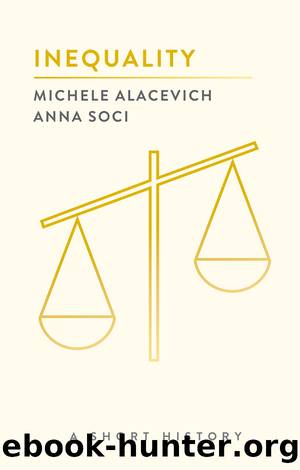Inequality by Michele Alacevich

Author:Michele Alacevich
Language: eng
Format: epub
Publisher: Brookings Institution Press
THE SOCIAL COST OF INEQUALITY AND ITS REVERBERATION ON DEMOCRACY The supposed inverse relationship between inequality and (the quality of) democracy appears even more nefarious when one considers the self-sustaining mechanism acting through the purely social consequences of economic disparities.
A 2009 study by Richard G. Wilkinson and Kate Pickett provides evidence of the impressive correlation between inequality and social disadvantage in a wide sample of rich and industrialized countries.23 More unequal countries do worse on almost every quality-of-life indicator, such as level of trust, mental health, life expectancy, infant mortality, obesity, children’s educational performance, teenage birth rate, homicide rate, imprisonment rate, and social mobility. Wilkinson and Pickett’s message is clear: if social problems were caused by material life conditions, the more affluent countries should perform better than the less affluent ones (still in the same group of rich countries). Instead the evidence suggests that it is the relative position of individuals and groups within a society that matters the most: where income differences are bigger, social distances are bigger too, and social stratification is stronger. When inequality grows, the differences between population groups strengthen. Eventually, what distinguishes these groups is their social distance. This distance can reach enormous proportions and can lead to social exclusion through disparities in the consumption sphere, in health and housing conditions, in access to education and to the labor market, in the social relations network (so-called social capital), and in social mobility. Though it is not the only cause of social stratification, income inequality has a crucial impact on it.
These aspects have recently drawn investigators’ attention because of the greater collective awareness of the risks of growing inequality.24 The ills of society are perceived more and more as threats to social cohesion and political structures. Among the potential drivers of inequality, three seem particularly relevant: health care, education provision, and social mobility. Whereas income inequality undoubtedly affects health inequality, the inverse correlation is less strong. Of course, health inequality is a fundamental issue, representing perhaps the greatest social injustice.25 And yet it does not seem to directly affect disparities in income except in less developed countries, where chronic malnutrition and illnesses prevent people from earning a living. In the case of education provision and social mobility the correlation with inequality works both ways: when they are missing, income inequality increases, and when income inequality is high, education provision and social mobility decrease.
When inequality is high, education cannot play its role of social equalizer. Access to high-level schooling for low-income (and low-education) families is narrowed, if not virtually suppressed, because they are excluded from the credit market. Moreover, the rich often resist funding public schooling through taxes, leading to a generalized underfunding of public educational institutions. For instance, public spending on education is on average lower in countries such as Britain and the United States, where the rich participate more in the political process than the poor, and higher in countries such as Sweden and Denmark, where levels of political participation are approximately similar across the income scale.
Download
This site does not store any files on its server. We only index and link to content provided by other sites. Please contact the content providers to delete copyright contents if any and email us, we'll remove relevant links or contents immediately.
The Secret History by Donna Tartt(18994)
The Social Justice Warrior Handbook by Lisa De Pasquale(12175)
Thirteen Reasons Why by Jay Asher(8871)
This Is How You Lose Her by Junot Diaz(6854)
Weapons of Math Destruction by Cathy O'Neil(6246)
Zero to One by Peter Thiel(5760)
Beartown by Fredrik Backman(5706)
The Myth of the Strong Leader by Archie Brown(5479)
The Fire Next Time by James Baldwin(5408)
How Democracies Die by Steven Levitsky & Daniel Ziblatt(5198)
Promise Me, Dad by Joe Biden(5127)
Stone's Rules by Roger Stone(5065)
A Higher Loyalty: Truth, Lies, and Leadership by James Comey(4937)
100 Deadly Skills by Clint Emerson(4898)
Rise and Kill First by Ronen Bergman(4757)
Secrecy World by Jake Bernstein(4724)
The David Icke Guide to the Global Conspiracy (and how to end it) by David Icke(4680)
The Farm by Tom Rob Smith(4484)
The Doomsday Machine by Daniel Ellsberg(4472)
